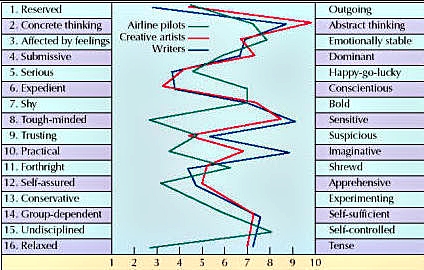Iets persoonlijks vragen
 Merkenrecht. Tegen Gemeenschapswoordmerk 16PF, afkorting van ´16 Personality Factors, wordt een nietigheidsprocedure gevoerd. Het merk is gebasserd op een vragenlijst rondom (jawel) zestien verschillende persoonlijkheidskenmerken [wikipedia]. Op basis van absolute weigeringsgronden wordt getoetst. Het ingeschreven merk 16PF heeft onderscheidend vermogen is niet beschrijvend en geen soortnaam geworden. Tot slot wordt geconcludeerd dat er geen sprake is van een depot kwader trouw. Bevestigd beslissing OHIM, afwijzing van de nietigheidsactie.
Merkenrecht. Tegen Gemeenschapswoordmerk 16PF, afkorting van ´16 Personality Factors, wordt een nietigheidsprocedure gevoerd. Het merk is gebasserd op een vragenlijst rondom (jawel) zestien verschillende persoonlijkheidskenmerken [wikipedia]. Op basis van absolute weigeringsgronden wordt getoetst. Het ingeschreven merk 16PF heeft onderscheidend vermogen is niet beschrijvend en geen soortnaam geworden. Tot slot wordt geconcludeerd dat er geen sprake is van een depot kwader trouw. Bevestigd beslissing OHIM, afwijzing van de nietigheidsactie.
59. In the present case, the Board of Appeal was right to find that 16PF was commonly used in scientific publications to designate a specific questionnaire based on Dr Cattell’s research. The Board of Appeal found however that that was not sufficient to prove that the sign 16PF is generic in nature, because the specialised public was informed that that questionnaire came from a particular source. In other words, 16PF is commonly referred to as a source indicator and not as ‘an equivalent of any type of personality questionnaire’, regardless of its commercial origin.
90 (…) It must be pointed out, first, that the fact that the applicant for the trade mark knows or must know that a third party has for a long time been using, in at least one Member State, an identical or similar sign for an identical or similar product capable of being confused with the sign for which registration is sought is not sufficient, in itself, to prove that there is bad faith on the part of the applicant for the trade mark and, secondly, that a person’s right to protect his own mark cannot be undermined by unlawful use of that mark on the part of third parties.
91. Furthermore, it is apparent from the file that the intervener acted in order to prevent such a use of its mark 16PF (see paragraph 27 of the contested decision). The Board of Appeal correctly stated that it was altogether legitimate to take the measures necessary to protect a mark of which the holder legitimately claims to be the proprietor, including the registration of that mark.
Lees het arrest hier (link)
Art. 7(1)(b)-(d) en 52(1)(b) GemVo 207/2009
Inmiddels is de vragenlijst door Psytech hernoemd van 16PF naar 15FQPlus: zie hier.



























































































